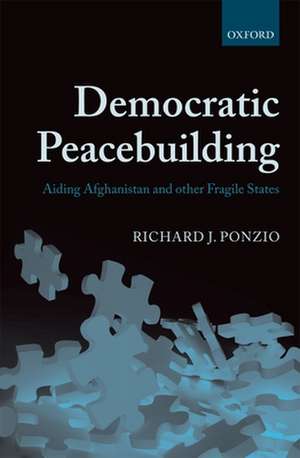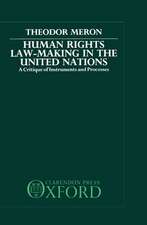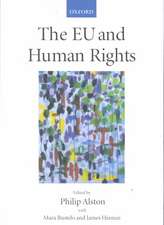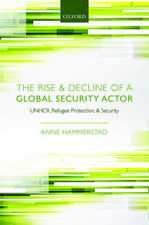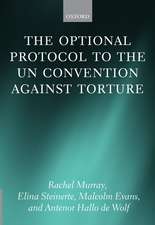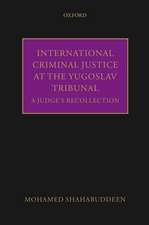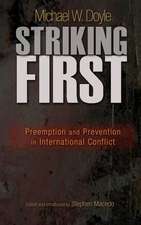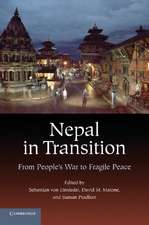Democratic Peacebuilding: Aiding Afghanistan and other Fragile States
Autor Richard J. Ponzioen Limba Engleză Hardback – 27 ian 2011
Preț: 805.06 lei
Preț vechi: 1156.52 lei
-30% Nou
Puncte Express: 1208
Preț estimativ în valută:
154.07€ • 160.25$ • 127.19£
154.07€ • 160.25$ • 127.19£
Carte tipărită la comandă
Livrare economică 03-09 aprilie
Preluare comenzi: 021 569.72.76
Specificații
ISBN-13: 9780199594955
ISBN-10: 0199594953
Pagini: 314
Dimensiuni: 170 x 244 x 24 mm
Greutate: 0.64 kg
Editura: OUP OXFORD
Colecția OUP Oxford
Locul publicării:Oxford, United Kingdom
ISBN-10: 0199594953
Pagini: 314
Dimensiuni: 170 x 244 x 24 mm
Greutate: 0.64 kg
Editura: OUP OXFORD
Colecția OUP Oxford
Locul publicării:Oxford, United Kingdom
Recenzii
[A] timely study ... recommended [for] upper-division undergraduates and above.
Whether and how to promote democracy in the context of post-conflict peacebuilding is one of the most vexing issues of our time. Meticulously researched, this study offers invaluable insights into the problems and prospects of democratization after war with particular attention to recent experiences in Afghanistan.
In this new study Richard Ponzio explores the role of democratic reform as an instrument for international peacebuilding, recognizing that the ultimate test of any such intervention is whether in the end one is able to leave behind a society at peace with itself and its neighbors
Democratic Peacebuilding is a path-breaking work that tackles one of great conundrums of peace-building. For a peace to be stable, it must also be legitimate; and for the legitimacy to count, it must be locally legitimate. Drawing on in depth studies of the efforts to create peace in Afghanistan and elsewhere, Richard Ponzio exposes readers to all the challenges of legitimate peace-building and points the way toward a new understanding of what best practices should involve.
This book is an important and timely contribution to our understanding of international peacebuilding in the aftermath of conflict. It combines conviction and theoretical sophistication with useful country studies. It presents a realistic assessesment of the possibilities of and obstacles to building and consolidating democracy in war-torn societies. The author also provides specific and compelling policy recommendations about the ways to advance the 'democratic peacebuilding' approach. This thoughtful volume is essential reading for policymakers, academics and students interested in one of the most vital international policy issues of our time.
Whether and how to promote democracy in the context of post-conflict peacebuilding is one of the most vexing issues of our time. Meticulously researched, this study offers invaluable insights into the problems and prospects of democratization after war with particular attention to recent experiences in Afghanistan.
In this new study Richard Ponzio explores the role of democratic reform as an instrument for international peacebuilding, recognizing that the ultimate test of any such intervention is whether in the end one is able to leave behind a society at peace with itself and its neighbors
Democratic Peacebuilding is a path-breaking work that tackles one of great conundrums of peace-building. For a peace to be stable, it must also be legitimate; and for the legitimacy to count, it must be locally legitimate. Drawing on in depth studies of the efforts to create peace in Afghanistan and elsewhere, Richard Ponzio exposes readers to all the challenges of legitimate peace-building and points the way toward a new understanding of what best practices should involve.
This book is an important and timely contribution to our understanding of international peacebuilding in the aftermath of conflict. It combines conviction and theoretical sophistication with useful country studies. It presents a realistic assessesment of the possibilities of and obstacles to building and consolidating democracy in war-torn societies. The author also provides specific and compelling policy recommendations about the ways to advance the 'democratic peacebuilding' approach. This thoughtful volume is essential reading for policymakers, academics and students interested in one of the most vital international policy issues of our time.
Notă biografică
Dr. Richard Ponzio is a leading expert on international peacebuilding and political development. He has served in the Balkans, Central-South Asia, the South Pacific, and West Africa with the U.N. and U.S. State Department. He is a former Senior Policy Analyst with the U.N. Peacebuilding Support Office in New York, as well as Visiting Scholar at The Stimson Center and Middle East Institute in Washington, D.C. He is co-editor of Pioneering the Human Development Revolution: An Intellectual Biography of Mahbub ul Haq (OUP, 2008)
